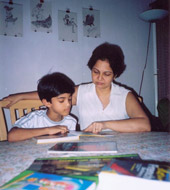 |
| HOMING IN: Varun goes over his lessons with Sangita; |
Fourteen-year-old Nupur and her younger sister, 12-year-old Diya, have just moved into an apartment block in Bangalore from Dubai with their family. It’s their first week in the city and friendships are being made with other neighbourhood kids. “So which school do you go to?” asks a new friend. “We do home schooling,” answers the older sister. “You mean you don’t go to school?” chorus some of the kids. “How lucky!” add the rest, enviously.
For their parents Vasuraj and Sangita, however, it was “sheer necessity” that drove them to consider the option of home schooling. “It’s not because I am a radical thinker or anything,” says Sangita. “But I have no faith in the Indian education system”.
Their arguments against institutionalised education are many. But what really troubles them about the education system in India is the fact that marks and grades are all-important. And that most schools restrict their teachings only to the curriculum — they do not encourage reference work or extra reading. The “bad schooling experience’’ was very much present in Dubai too where the girls were going to an Indian school. “The teachers did not encourage questions from the children,” says Sangita. Nupur, who was slightly dyslexic, was moved to the last bench. The girls soon started losing interest in studies and school.
It is evident that the couple, who have three kids, have had not had a positive experience with schools. Their tale of woes began in Chennai where they had stayed for a while before moving to Dubai. But if the quest for other options had begun while in India, “Dubai just pushed it to the brink,” says Sangita. The new set-up, maintains Sangita, further alienated her children, making them backbenchers, which subsequently diminished their self-confidence. It was while she was in Dubai that Sangita began her research on the Net for an alternative and came across the option of home schooling. Initially a bit apprehensive, she quickly became sold on the idea. In the given circumstances, it seemed the best remedy.
They had only one doubt about home schooling — who would certify the children for higher studies. That doubt was resolved when Sangita found that her children could sit privately for Indian board exams like the CBSE, ICSE or any local state boards. “I had seen these ads in newspapers by private tutorials. They essentially invite students who have failed in their board exams to be coached for the same and then sit for them privately.” However, Sangita finally chose to go in for the International General Certificate of Secondary Education (IGCSE). “I prefer this because it is recognised internationally. The British Council has provisions for appearing for the exams.”
The family started the home schooling experiment in 2002. Today, after two years, they are happy they took this step. A typical “learning” day in the Vasuraj family begins at 10 in the morning. “This will vary from family to family,” says Sangita. “In the West, especially in America, where there are more families taking to home schooling, people prefer to study after dinner.” Sangita organises the children’s worksheets in advance and the previous night, she instructs them on what has to be done. “I am a late riser, so by the time I wake up the children are into their studies.”
Most of the teaching material is Net-driven. “There are a lot of sites offering study material for all age groups,” says Sangita. “Samples of revisions and tests are available on CD-Roms in bookstores.” But how does she implement the strict discipline that a school routine commands? “As far as organising time for studies is concerned, I am still learning,” admits Sangita. Her mantra, she adds, is to give the children exactly what they want to learn and “not thrust anything down their throats”. Varun, the youngest, is allowed to bunk his “classes” once in a while “as the whole principle of home schooling is studying at your own pace”.
And how do the kids feel about being different from the peers around them? “Nupur does miss mixing with other children and the socialising that ordinary schooling brings with it,” admits Sangita. But she feels that her younger sister Diya, “who is a little more reserved”, finds home schooling the best option since she excels only when allowed to do things at her pace. “My friends are always complaining about school and how boring it is. I definitely have a better time,” says the 12-year-old. Varun however wants to be like other children. “I want to go to school,” he says emphatically.
The couple say their home schooling experiment evokes mixed reactions from their friends and family. “Most of them are unable to comprehend the absence of structured learning,” says Sangita. “Many parents ask how we inculcate a competitive spirit in our children,” adds Vasuraj. “But I think the need to excel and compete comes from within. I am confident that it is not a cause for concern.”










